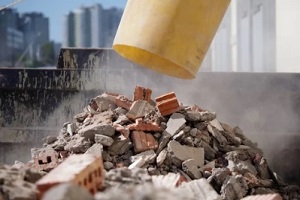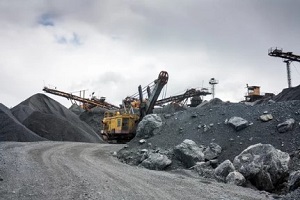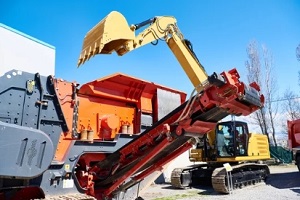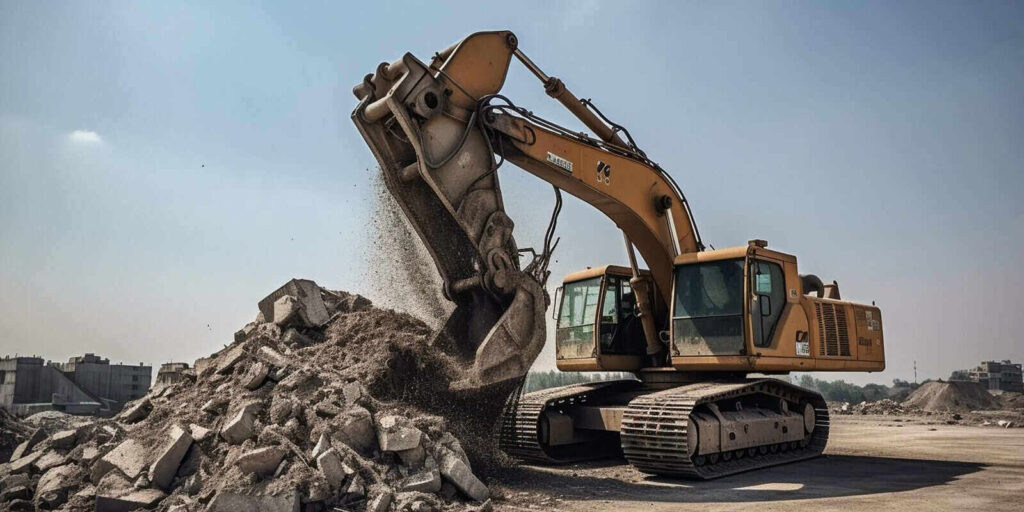Due to the prolific amounts of concrete waste generated during construction projects, concrete recycling has become a pivotal practice. It curtails waste, helps save the environment, and reduces project costs. If you want to become more sustainable and economically efficient, understanding concrete recycling and selecting the appropriate crusher is critical.
Why Concrete Recycling?
 Recycled concrete generally costs less than new concrete, substantially reducing project expenses. Instead of paying landfill tipping fees or incineration costs, recycling allows you to re-utilize the material, reducing unnecessary costs.
Recycled concrete generally costs less than new concrete, substantially reducing project expenses. Instead of paying landfill tipping fees or incineration costs, recycling allows you to re-utilize the material, reducing unnecessary costs.
Furthermore, using recycled concrete can reduce the need for new concrete production. This could translate into substantial savings when considering the costs of producing new concrete, from raw material extraction to transportation.
Concrete recycling also offers impressive environmental benefits. Landfills are rapidly filling up, and creating additional space is increasingly challenging due to a lack of suitable locations and rising costs. Additionally, the decomposition of concrete in landfills generates harmful greenhouse gasses.
Recycling concrete reduces the demand for new raw materials, thus preserving natural resources and decreasing emissions associated with mining and transportation.
Understanding The Concrete Recycling Process
To optimize concrete recycling, understanding the entire process can be incredibly beneficial. First comes the collection and sorting of concrete waste. The generated waste is sorted, removing contaminants and separating different aggregate sizes.
Next, the sorted concrete waste is crushed, often multiple times, until the desired size is reached. Concrete crushing is a crucial point where crusher selection becomes pivotal.
Quality control measures are then implemented to ensure the processed materials meet the required standards for use, such as physical properties and composition. The end products of recycled concrete vary, mainly consisting of aggregate used for road sub-base, gravel, retaining walls, and pavements.
Choosing The Right Crusher For Concrete Recycling
Just as you wouldn’t choose a sledgehammer to put in a picture hook, crusher selection for concrete recycling is all about picking the right tool for the job. Factors to weigh include the size of the concrete to be crushed, the expected volume of recycled material, mobility requirements, and, most critically, the hardness and amount of rebar in the concrete.
These factors will determine what type of crusher will work best for your project. However, it’s also essential to be aware of the different types of concrete crushers suited to working with concrete.
Portable Concrete Crusher
The portable concrete crusher shines in its flexibility and adaptability. It’s a wheel-mounted, mobile crushing machine perfect for processing concrete waste. It offers cost-saving advantages, reducing the need for extra labor, logistics, and facilities, which is particularly beneficial for projects with strict timetables and budgets.
Moreover, the portable crusher can load various fixed crusher machines, integrating the convenience of mobility with the power and efficiency of stationary equipment. You tap into the best of both worlds with this type of crusher.
However, it has limitations in terms of the size of the material it can handle. Larger blocks or slabs may pose difficulties in processing. Also, constant moving and setting up might lead to increased wear and tear compared to fixed crushers, requiring more frequent maintenance.
Mobile Concrete Crusher
 While similar in mobility to the portable crusher, a mobile crusher comes with extra advantages. Using a tracked or crawler mounting, allowing 100 percent free movement, makes it highly versatile. You can move within and between sites without hassle, a bonus point for projects that span multiple locations.
While similar in mobility to the portable crusher, a mobile crusher comes with extra advantages. Using a tracked or crawler mounting, allowing 100 percent free movement, makes it highly versatile. You can move within and between sites without hassle, a bonus point for projects that span multiple locations.
The mobile crusher’s climbing capabilities are undeniably advantageous for multitiered or steep locations. Additionally, all installation steps can be performed within two hours, enhancing your productivity significantly.
While these may seem favorable, the challenges appear in tightly confined areas. Maneuvering can be problematic in such spaces. Also, projects with strict weight restrictions may not be suitable for heavier models of mobile crushers.
Small Concrete Crushers
At times, a smaller tool is much more practical. Small concrete crushers are designed with these situations in mind. They cater to reduced output requirements and are perfect for dealing with smaller concrete materials.
Being lightweight, they are easy to transport, move around on-site and significantly reduce the potential impact on the surrounding environment. The types range from jaw crushers with fixed and mobile options differing in weight, capacity, feeding size, and power.
Their shortfall, however, lies in their production capacity. For larger-scale projects requiring a more substantial output, small crushers may not meet the demand. So, although perfect for smaller-scale projects, their application is limited.
Excavator Concrete Crusher
An excavator concrete crusher can handle concrete mixed with mud and scrap effortlessly. Its high-strength wear resistance and the ability to directly install or connect it to the excavator make it incredibly versatile.
This tool is particularly useful for demolition projects.
It is designed to remove walls, concrete slabs, and bridge decks efficiently. The pressing force it applies to separate concrete from the embedded steel reinforcement is genuinely remarkable.
There is a drawback, though. The use of an excavator concrete crusher requires a compatible excavator. If your project does not require such machinery, this crusher type may not be the most practical or cost-effective solution.
Concrete Crusher Bucket
 Dealing with mixed and challenging materials is simplified by the concrete crusher bucket. Mount it onto a wheel loader and watch as it efficiently handles reinforced concrete. With a robust crushing force, it can even process tricky combinations, such as wood scraps mixed with metal parts.
Dealing with mixed and challenging materials is simplified by the concrete crusher bucket. Mount it onto a wheel loader and watch as it efficiently handles reinforced concrete. With a robust crushing force, it can even process tricky combinations, such as wood scraps mixed with metal parts.
Conversely, the concrete crusher bucket can struggle with mixed materials or tough concrete. Plus, only some loader types might be compatible, which could require additional investment.
Maximize Your Concrete Recycling Results With The Right Crusher From Mellott
Having the best crusher for your concrete recycling project can lead to exceptional performance, higher productivity, cost savings, and improved efficiency. By selecting the right tool, you’re investing in a seamless workflow, fewer operational hiccups, and significantly reducing potential downtime.
Mellott’s rock crusher experts can help you find the crusher best suited to your project parameters. We offer an extensive range of crushers, each delivering unique advantages to maximize your project’s success. Contact us today at 888.621.8533 or online, and let’s start working on your concrete recycling project together.

